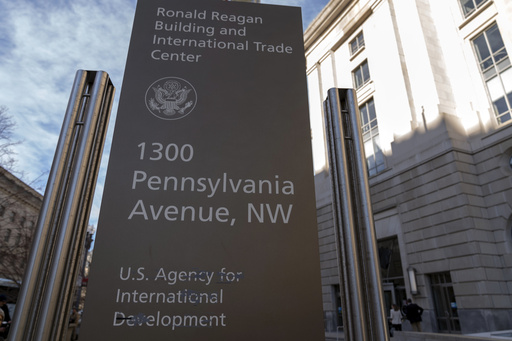
The White House has dismissed the inspector general of the U.S. Agency for International Development (USAID) as of Tuesday, according to U.S. officials. This decision follows a report from his office indicating that the Trump administration’s actions to dismantle USAID have greatly hindered oversight of $8.2 billion in humanitarian funds that remain unspent. Officials familiar with the matter, who requested anonymity, stated that no explanation was provided for Inspector General Paul Martin’s termination.
Inspectors general serve as independent watchdogs within government agencies, focusing on identifying waste, fraud, and abuse. The Trump administration had previously removed more than a dozen such inspectors. On Monday, Martin’s office issued an urgent report, claiming that the administration’s freeze on foreign aid and staff cuts at USAID have rendered aid oversight nearly non-functional. The report emphasized the agency’s diminished capacity to ensure that no funds are diverted to extremist groups or misused in conflict zones.
This dismissal, reported initially by CNN, is one of several controversial actions taken by the Trump administration regarding the agency, including efforts to reduce its workforce significantly. Trump and his supporter, Elon Musk, have criticized USAID’s missions as misaligned with the administration’s priorities.
In a parallel development, a lawsuit was filed on Tuesday accusing the administration of financially harming American companies by delaying payment on substantial outstanding invoices for completed work. The lawsuit alleges that the administration’s swift freeze on foreign aid has led to massive layoffs among U.S. contractors and suppliers working with USAID, including 750 furloughs at Chemonics International, based in Washington, D.C. The legal action emphasizes the far-reaching consequences of the administration’s decisions, from businesses shutting down to children facing hunger and communities at risk of disease.
The legal challenge has been joined by a coalition of 170 small businesses, major suppliers, and organizations such as HIAS, which assists displaced individuals overseas, along with the American Bar Association. The plaintiffs filed the lawsuit in U.S. District Court in Washington against President Trump, Secretary of State Marco Rubio, acting USAID Deputy Administrator Peter Marocco, and Russell Vought, the director of the Office of Management and Budget. This lawsuit marks the third legal attempt to challenge the administration’s actions against USAID and its global programs. Previously, a legal challenge from federal employees’ associations temporarily halted the efforts to reduce USAID staffing significantly.
Despite the ongoing challenges, the funding freeze and related actions remain in place, with reports indicating that USAID has lost its lease on its Washington headquarters. The administration is alleged to have terminated contracts without adhering to the necessary 30-day notice or making back payments for work completed. Individuals familiar with the situation, who provided insight anonymously to avoid reprisal from the administration, disclosed that Chemonics has been impacted by $103 million in unpaid invoices and nearly $500 million worth of essential goods stuck in the supply chain.
The lawsuit further warns that Delayed delivery of health commodities could result in a staggering number of preventable deaths linked to HIV/AIDS, malaria, and unmet reproductive health needs, potentially affecting around 566,000 lives, including 215,000 children. The plaintiffs contend that the administration lacks the authority to impede programs and funding that Congress has mandated.
Marocco defended the administration’s funding halt and the decision to furlough thousands of USAID workers, attributing this necessity to alleged “insubordination” and “noncompliance” among the staff. He suggested that these issues warranted a complete review of each aid program to determine which could continue. USAID workers, however, dispute these claims, asserting that such accusations are merely a pretext for dismantling the agency.
In a related legislative effort, seven Republican lawmakers from agricultural states have introduced a bill aimed at protecting a longstanding $1.8 billion food-aid program operated by USAID. Their proposal seeks to shift the Food for Peace program to the Department of Agriculture, illustrating the impact of the administration’s funding freeze on American farmers who represent a crucial support base for Trump. Senator Jerry Moran, a Republican from Kansas, expressed gratitude to Rubio for his intervention that allowed for $560 million in U.S.-grown commodities, originally stuck in ports due to the funding freeze, to be directed towards global hunger initiatives.

